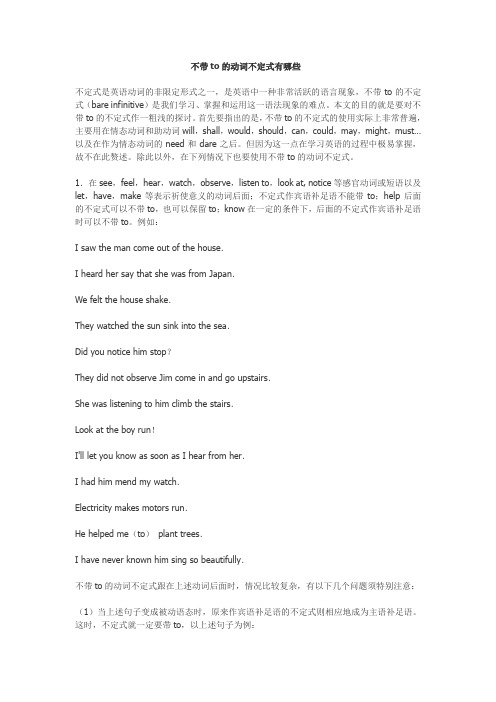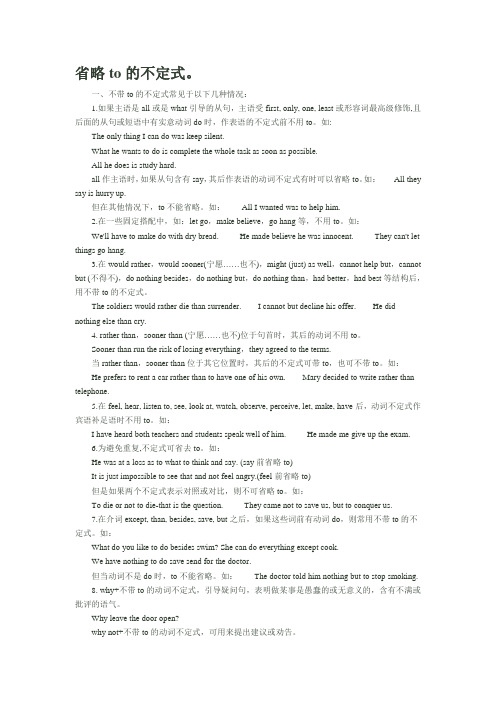(1)We found the farm crops(to) do well.
(2)I find the Chinese people to be happy and cheerful.
(8)I had sooner live on a farm than in the city.
(9)He would sooner resign than take part in such dishonest business deeds.
(8)He observed someone open the door.
(9)I did not perceive anyone come in.
(10)He beheld her go out.
(5)Could you do something for me?
(6)You shall go at once.
(7)He might be working in the office now.
(4)I heard her play the piano.
(5)He listend to us talk.
(6)I felt the floor move.
(7)I didn’t notice you enter.
不带to的动词不定式通常有下面十八种情况.txt今天心情不好。我只有四句话想说。包括这句和前面的两句。我的话说完了对付凶恶的人,就要比他更凶恶;对付卑鄙的人,就要比他更卑鄙没有情人味,哪来人情味 拿什么整死你,我的爱人。收银员说:没零钱了,找你两个塑料袋吧! 不带to的动词不定式通常有下面十八种情况
(10)I'd rather not tell you.
(11)He said he'd sooner die than betray his friend.
八、在but(=except),besides,than后的动词不定式一般要带to,但如果其前有作谓语的实义动词do,则不定式不带to
(1)John was made to wash the truck for a week as a punishment.
(2)He was made(to) laugh.
(3)The child was let(to) do it.
(6)He did nothing else than laugh.
(7)I could hardly do less than wait.
九、不定式作表语时,如主语部分含有实义动词do,且句子的时态为一般现在时或一般过去时(多为is或was),不定式可以带to也可不带to
(6)I would rather go mountain—climbing than just take a walk.
(7)My aunt invited me to the movies,but I said I had rather go on a picnic with the girls.
四、使役动词make,let,have,bid, leave(=let)后作宾语补足语的动词不定式不带to
(1)You may take a horse to the water,but you can't make him drink.
(2)I'll let him do it.
五、never与know连用其后作宾语补足语的动词不定式可省to,其时态多为完成时态。
(1)I never knew him act without thinking.
(2)I've never known it snow in July before.
(8)I don't think you need have come yesterday.
(9)They should be here by now.
(10)If you will go into the fields and turn over a few big stones,you are sure to uncover a city of ant"people".
soon…as…后的动词不定一般不带to
(1)When the country calls you for help,you cannot but go.
(2)He can't help but feel sorry for her.
(1)I can speak English.
(2)May I come in?
(3)Dare he swim across the river?
(4)We must work,and above all we must believe in ourselves.
(4)The children found there was nothing they could do with their money,except spend it on sweets.
(5)There seemed nothing else to do but(to)send for a doctor.(but前的实义动词do不作谓语,but后的不定式可带to,也可不带to)
(3)I had never known her ask for pity before.
有时ever与known连用也有上述用法。
(1)Have you ever known me tell a lie?
但与情态动词ought(to)连用时通常带to,和to)连用时必须带to
三、在表示感觉的动词如:see,look.at,watch,hear,listen
to,feel,notice,observe,perceive(觉察,看见),behold(书面用语“见到”)等后用作宾语补足语的动词不定。
(1)I saw her cross the street.
(2)He looked at the children walk up the hill.
(3)I watched the boy cross the road.
(1)What we must do now is(to) find anther person to help us.
(3)he cannot choose but obey.
(4)I had better leave now,or I'll be late.
(5)He had best buy it now while it is still available.
(1)The soldier has no choice but to obey.
(2)He did not have any choice but to obey.
(3)She did nothing but clean the dishes.
但除notice,watch不用被动语态外,上述动词变成被动语态时,其后的动词不定式就不省to
(1)She was seen to cross street.
(2)She was heard to play the piano.
动词不定式通常带有符号to,叫做带to的动词不定式(infinitive with"to"),动词不定式有时不带符号to,叫做不带to的动词不定式(infinitive without"to")
不带to的动词不定式通常有下面十八种情况
一、与助动词do连用构成谓语动词的否定、疑问和强调形式。
(4)Did they take you home?
(5)He does look tired.
(6)They did come yesterday.
二、与情态动词连用构成复合谓语
(3)I found this to be true in all the cities.
(4)We found him (to be) honest/dishonest.
七、在cannot but,cannot help but,can not choose but, had better(best),would(had) rather(sooner)…than…, would as
(3)Don't forget to have them come.
(4)Bid him go home.
(5)Leave him go.
动词have通常不用于被动语态,make和bid可用于被动语态,let偶尔也可用于被动态,用作主语补足语的动词不定式通常带to,但在make和let后有时可以不带to
(1)he does not work in the factory.
(2)Does she work here?
(3)I did not see her yesterday.














